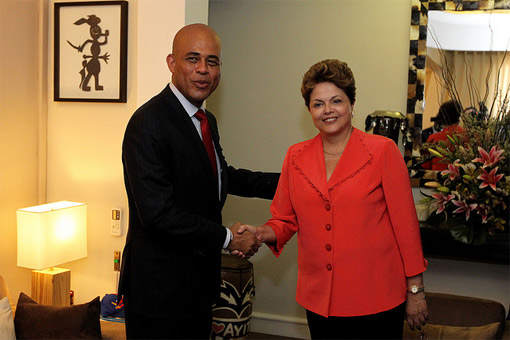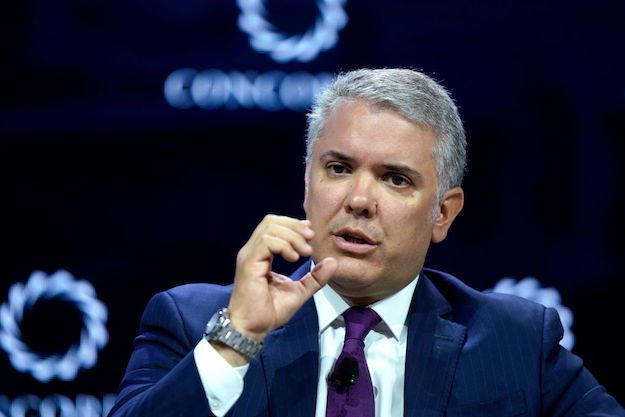After a year in power, President Michel Martelly still faces the huge challenges of reconstructing a country destroyed by natural catastrophes and bad governance. In spite of growing foreign investments, the economy remains weak and vulnerable. The enormous task of finding adequate housing for over a million displaced individuals persists, and there are fears that the country is facing another outbreak of cholera, which has already claimed the lives of more than 7,000 people. So far, the “moun en deyo”—the marginalized—continue to be left out of any meaningful participation in the decision-making process, and the deep divisions that have defined Haitian politics show no signs of abating.
Moreover, lawmakers rejected Martelly’s first two choices of prime ministers, and the third, Gary Conille, who was ratified, resigned after serving only four months in office. The first year of Martelly’s presidency has thus been marked by a continuous crisis of governability. It remains to be seen whether Laurent Lamothe, the recently appointed prime minister and intimate friend of the president, will help move the country in a more promising direction.
The truth is that President Martelly, like his predecessors, has little room to maneuver. His government is weak and its sovereignty at bay. External powers fund about 70 percent of Haiti’s budget and the very survival of the government depends on the continued flow of foreign assistance. Reconstruction offers the Martelly regime and the international community an opportunity to reverse more than 30 years of failed policies that have emasculated the state and undermined the local economy. However, the president and his international partners must be willing to seize the moment and boldly change course; unfortunately, all indications suggest that this is unlikely to happen.
To date, fears of corruption and a blind ideological commitment to the market have led foreign donors to bypass the state and emphasize development led by non-governmental organizations. A shift from this model to a new strategy bent on building state capacity, privileging massive public works for infrastructural development and generating food self-sufficiency is desperately needed. But powerful domestic and international interests constrain Martelly from achieving such goals, even if he were fully committed to them.
The political class and the traditional ruling elite that have contributed to the country’s current crises have remained politically and economically dominant. La politique du ventre (the kleptocratic “politics of the belly”) that has characterized the Republic’s mode of governance since its inception continues to undermine the rise of a collective sense of civic obligation. Moreover, the state’s institutional incapacity makes it difficult to implement any national policy.
Martelly’s margin of action is circumscribed further by his lack of a parliamentary majority; his party, Réponse des Paysans has only three deputies in the Congress and no representation in the Senate. His dearth of political experience has also contributed to the difficulties he has had managing a complicated and uneasy “cohabitation” with a gelatinous and opportunist legislative branch.
These tensions reached a point of crisis when Deputy Arnel Bélizaire was illegally arrested in the aftermath of a heated verbal exchange with President Martelly. While Bélizaire was promptly released, several members of the legislative branch accused the president of leading the country into a new despotism. Matters deteriorated further when Martelly stormed the private residence of Prime Minister Conille and insulted a group of lawmakers with whom he had been meeting. The confrontation precipitated the prime minister’s eventual resignation. In addition, Senator Moïse Jean-Charles accused the president along with several members of his administration of having multiple nationalities and thus illegally holding public office. The president denied these explosive allegations—and U.S. Ambassador Kenneth Merten declared that he was not an American—but Martelly did not convince all lawmakers.
Tensions between the legislative and executive branches remain high, in spite of Lamothe’s ratification as prime minister. With a series of contentious and critical issues to be resolved, another crisis may be in the making. The establishment of a new Electoral Council to organize overdue senatorial and municipal elections, the unresolved questions related to the legality of the constitutional changes passed by Parliament in the last hours of René Préval’s administration, and the controversial restoration of the Haitian military are all likely to generate significant conflicts between the executive branch and parliament. Moreover, negotiating the modalities for the departure of the United Nations Stabilization Mission in Haiti (MINUSTAH) will be a complicated and challenging task.
While Martelly favors the restoration of the armed forces to fill the void left by MINUSTAH’s eventual exit, it is difficult to envisage a truly professional and impartial security and military apparatus. At the moment, a “rogue” paramilitary force masquerading as veterans of the Haitian armed forces moves about freely in spite of repeated governmental calls for its disbanding. President Martelly has condemned this rogue force, but his connections with officers of the old armed forces and commitment to restoring the Army have emboldened the band.
Persistent allegations of corruption at the highest level of the Republic continue to undermine public trust in government. Haitians have a sense that plus ça change plus c’est la même chose (the more things change the more they stay the same), but they also share a sense that Martelly has generated great expectations for a new Haiti. Indeed, he has occupied the political terrain like no other president. Continuously on the move and making multiple public appearances at home and abroad, he is the “hyper-president” seeking to offer a new image of Haiti.
Martelly also is attempting to renegotiate the terms of Haiti’s dependence on foreign powers and international financial institutions; and he voices the necessity of building the country’s food security and sovereignty. He persists in trying to move earthquake refugees from their destitute camps to permanent housing and is establishing the foundations for a system of free education for children. At the same time, he still questions the supremacy of the NGOs as the prime agents of Haiti’s reconstruction.
The legacy of history does not bode well for this progressive agenda. In spite of his “hyper-presidency,” Martelly has failed to establish an effective government and viable structures for the reconstruction of Haiti. To that extent, his first year in power has been a year of wasted opportunities. The incoming Lamothe government gives Martelly a new chance to make good on his promises. At the moment, however, great uncertainties persist. Hope and optimism, among Haitians and foreign observers alike, coexist with cynicism and pessimism.








